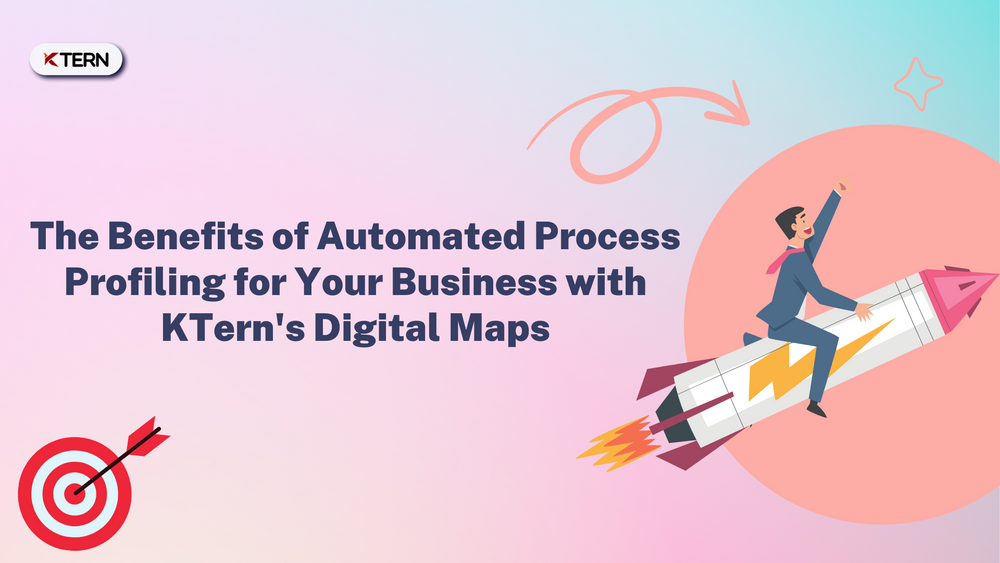The Benefits of Automated Process Profiling for Your Business with KTern's Digital Maps
In today's business environment, it's essential to optimize processes for maximum efficiency and productivity. One way to achieve this is through process profiling, which involves analyzing and mapping out your organization's workflows.
However, this can be a daunting task, especially for large enterprises with complex operations. Fortunately, automated process profiling tools like KTern's Digital Maps can make the process much simpler and more efficient.
In this article, we will explore the benefits of automated process profiling with KTern's Digital Maps and how it can help your business achieve better operational efficiency, reduce costs, and enhance overall performance.
Table of Contents
- Definition of automated process profiling
- Importance of automated process profiling for businesses
- The Benefits of Automated Process Profiling
- Explanation of KTern’s Digital Maps
- How KTern's Digital Maps Work
- Overview of KTern's approach to process profiling
- Key features and functionalities of Digital Maps
- Integration with other business applications
- Case Study: Examples of businesses that have successfully implemented KTern’s Digital Maps
- Factors to consider when implementing automated process profiling
- Who benefits by using KTern’s digital maps process profiler
- Conclusion
Definition of automated process profiling
Automated process profiling is the use of advanced technology to gather data about the processes within an organization and analyze them to identify areas that need improvement. The process involves mapping out the steps involved in a particular business process, analyzing the data collected from the process, and creating a visual representation of the process flow.
Automated process profiling is a critical tool for businesses that want to improve their processes, streamline operations, and increase efficiency. It allows organizations to identify bottlenecks, redundancies, and inefficiencies in their processes, helping them to optimize their workflows and achieve better results. By automating the process profiling, businesses can save time, reduce costs, and minimize errors associated with manual profiling methods.
With the rise of digitalization and automation, automated process profiling is becoming increasingly popular among businesses of all sizes. KTern's Digital Maps is a prime example of an automated process profiling tool that uses advanced algorithms to capture data from different sources and create a comprehensive process map. This technology provides businesses with a powerful tool to optimize their processes, minimize errors, and achieve their desired outcomes. As such, automated process profiling has become an essential tool for modern businesses looking to stay competitive in an ever-changing market.
Importance of automated process profiling for businesses
Automated process profiling is crucial for businesses in today's fast-paced and rapidly changing environment. It enables organizations to gain a deeper understanding of their business processes, identify inefficiencies, and make data-driven decisions to optimize their operations.
Automated process profiling also helps organizations to better understand their customers and their needs. By mapping out the customer journey, organizations can identify pain points and areas for improvement. This can help to increase customer satisfaction and loyalty, leading to improved revenue and growth.
Moreover, with automated process profiling, businesses can ensure compliance with regulatory requirements. By mapping out processes, organizations can identify potential risks and ensure that they are following all necessary regulations and guidelines.
In summary, automated process profiling is crucial for businesses looking to optimize their operations, reduce costs, increase efficiency, and improve customer satisfaction.
The Benefits of Automated Process Profiling
Automated process profiling offers several benefits to businesses, including:

Increased efficiency: By automating the process of identifying and documenting business processes, companies can save time and resources. This can lead to more efficient operations and higher productivity.
Better decision-making: Automated process profiling provides businesses with insights into their operations, enabling them to make data-driven decisions. This helps businesses to identify areas for improvement and optimize their processes to achieve better outcomes.
Improved compliance: With automated process profiling, businesses can ensure that they comply with regulatory requirements and industry standards. This helps to reduce the risk of penalties and legal issues.
Enhanced collaboration: Automated process profiling provides a common understanding of business processes, facilitating collaboration between different departments and stakeholders. This can lead to better communication and improved teamwork.
Scalability: Automated process profiling enables businesses to scale their operations more effectively by providing a structured approach to process documentation. This helps to ensure that processes are repeatable and can be easily replicated as the business grows.
KTern's Digital Maps
KTern's Digital Maps is a powerful tool that uses advanced algorithms to automate the process of process profiling. It helps businesses to map out their business processes in a visual and easy-to-understand format, providing a comprehensive view of their organization's workflows.
With Digital Maps, businesses can gain valuable insights into their processes, identify areas for improvement, and streamline their operations for better efficiency and productivity. The tool provides a detailed analysis of the organization's processes, redundancies, and other areas where improvements can be made.
Digital Maps can also help businesses to identify potential risks and compliance issues by providing a clear view of their processes. This helps them to stay on top of regulatory requirements and mitigate any risks that could impact their business.
Overall, KTern's Digital Maps is an essential tool for businesses looking to optimize their operations, improve their efficiency, and stay ahead of the competition. It enables businesses to gain a deeper understanding of their processes, identify areas for improvement, and make informed decisions to drive growth and success.
It also contains:
- Business Process Mining
- Landscape Assessment
- Custom Code Analysis
- Transformation Insights
- Timeline & Effort Estimation
How KTern's Digital Maps Works?
- KTern's Digital Maps use advanced process mining and analytics algorithms to automatically analyze and visualize business processes in real-time.
- These algorithms capture the digital footprint of all activities and tasks performed within a business process, including inputs, outputs, actors, and systems involved.

- Moreover, the Digital Maps can generate predictive insights to identify the likelihood of process variations, suggest optimal configurations, and identify process improvement opportunities.
- By using KTern's Digital Maps, businesses can gain a comprehensive understanding of their processes and optimize them for greater efficiency, cost-effectiveness, and improved customer satisfaction.
Overview of KTern's approach to process profiling
KTern's process profiler approach involves performing a comprehensive materiality analysis of all functional modules or Lines of Business (LoBs) in the existing system. This analysis enables businesses to identify which modules are heavily used and which are rarely used in the system. KTern provides a percentage relevancy based on the usage of each module, making it easier for businesses to prioritize their process improvement efforts.

Additionally, KTern's process profiler also identifies key stakeholders and users associated with each module and sub-processes present under each LoB. This provides a deeper understanding of who is responsible for each process, allowing businesses to involve relevant stakeholders in their process improvement initiatives.

KTern's approach to process profiling is comprehensive and data-driven, providing businesses with a clear understanding of their current processes and areas for improvement.

Key features and functionalities of Digital Maps
KTern's Digital Maps offer a range of features and functionalities that make the process of automated process profiling efficient and effective. Here are some of the key features and functionalities of Digital Maps:
Materiality analysis: Digital Maps perform a materiality analysis of all the functional modules or lines of business present in the system and identify how they have been configured in the existing landscape.
Usage analysis: Digital Maps help identify heavily and rarely used modules in the existing landscape and provide a percentage relevancy based on the usage.
Stakeholder analysis: Digital Maps identify key stakeholders/users associated with each module and sub-processes present under each line of business.

Process mapping: Digital Maps provide a graphical representation of the entire business process landscape, highlighting the connections and interdependencies between various modules and lines of business.
Collaboration: Digital Maps facilitate collaboration among various stakeholders involved in the process, allowing them to view and update the process map in real-time.
Risk assessment: Digital Maps help identify potential risks and bottlenecks in the process, enabling organizations to proactively mitigate them.
Benchmarking: Digital Maps allow organizations to benchmark their existing process landscape against industry best practices and identify areas for improvement.
Overall, Digital Maps provide organizations with a comprehensive and visual representation of their process landscape, enabling them to optimize their operations and drive business growth.
Integration with other business applications
KTern's Digital Maps can be integrated with other business applications such as project management tools, enterprise resource planning (ERP) systems, and customer relationship management (CRM) systems. This integration enables businesses to have a more holistic view of their processes, from planning and execution to customer engagement.

By integrating Digital Maps with project management tools, businesses can align their process improvements with their project goals and timelines. Integration with ERP and CRM systems allows for a more comprehensive view of how processes impact the entire business, from finance to customer satisfaction.
Additionally, KTern.AI offers a variety of APIs that enable businesses to integrate Digital Maps with their existing systems and tools, making the process seamless and efficient. This integration ensures that businesses can continue to leverage their existing investments while benefiting from the insights and improvements offered by Digital Maps.
Case Study: Examples of businesses that have successfully implemented KTern's Digital Maps
Building an SAP S/4HANA Business Case for Automotive Components Manufacturer in USA
Business Situation and Challenges
- With the outdated SAP ECC system in place, which was extremely rigid in addressing their current business needs, the customer was dealing with a number of process limitations.
- To establish the business case for switching to S/4HANA, the manufacturer of automotive components collaborated with their system integrator.
- To build the best plan possible, they realized that a lot of insights on the “as-is” system where needed.
- Estimates stated that it would take almost two months to complete and build a solid business case.
- The search was for automation-driven assessments to reduce the cost, time and effort required.
KTern’s Solution
To demonstrate the technical, functional, and business process implications of switching from ECC to S/4HANA, KTern was connected to the client's sandbox system and an automated assessment was carried out. In order to understand the effects of switching to S/4HANA and how it will affect present functions and related system data, they examined their current SAP ECC system.
- Automated Landscape Assessment
- Automated Business Process Assessment
- Automated Custom Objects Assessment
- Business Transformation Assessment
- Roadmap, timeline, and effort estimation
KTern-Driven Benefits
- Savings in costs and labour as a result of less resource deployment
- Significant time savings as a result of the removal of settings and manual work
- Increased efficiency and coordination between all project participants
Factors to consider when implementing automated process profiling
- Define clear objectives and goals for the implementation and ensure that they align with your business strategy and vision.
- Evaluate the scalability of the solution to ensure that it can accommodate the changing needs of your business as it grows.
- Assess the compatibility of the solution with your existing business applications and systems to avoid any integration issues.
- Consider the security and privacy aspects of the solution to ensure that your business data is protected.

- Define a clear implementation plan and allocate the necessary resources to ensure that the implementation is completed on time and within budget.
- Provide adequate training to your employees to ensure that they are equipped to use the solution effectively.
- Regularly evaluate and monitor the solution's performance and impact on your business processes to ensure that it continues to provide the expected benefits.
- Considering these factors will help you implement an automated process profiling solution successfully and reap the benefits it offers.
Who benefits by using KTern’s digital maps process profiler
KTern's digital maps process profiler benefits various stakeholders involved in the SAP implementation process. Here are some of the key stakeholders who benefit from using KTern's digital maps process profiler:
Business Process Owners: Business process owners can benefit from KTern's digital maps process profiler by gaining insights into their business processes, identifying bottlenecks and inefficiencies, and optimizing their processes for better performance.
SAP Functional Consultants: SAP Functional Consultants can benefit from KTern's digital maps process profiler by gaining a better understanding of the SAP system, identifying areas that need improvement, and designing solutions that align with the business process owners' requirements.
Testing Stakeholders: Testing stakeholders can benefit from KTern's digital maps process profiler by understanding the impact of changes made to the system, identifying potential risks, and designing effective test cases.
Project Managers: Project managers can benefit from KTern's digital maps process profiler by gaining visibility into the progress of the SAP implementation project, identifying areas that need attention, and making informed decisions to ensure the project's success.
Conclusion
In conclusion, automated process profiling with KTern's Digital Maps offers businesses numerous benefits. It enables organizations to identify key stakeholders, optimize processes, and gain insights into their SAP systems' usage. With KTern's unique approach to process profiling, businesses can expect to experience improved productivity, faster decision-making, and a better understanding of their SAP systems.
KTern's Digital Maps help organizations overcome the challenges associated with traditional methods of process profiling, enabling them to reduce costs and time while making informed decisions about their SAP systems.
Implementing Digital Maps requires careful consideration and planning, but by following best practices, businesses can ensure successful adoption and reap the rewards of a streamlined, efficient SAP system. Overall, automated process profiling is a game-changer for businesses looking to optimize their SAP systems and stay ahead of the competition.
If you wish to know more about the value added by KTern.AI, Get Started with us.
If you have any queries, feel free to Contact us.




